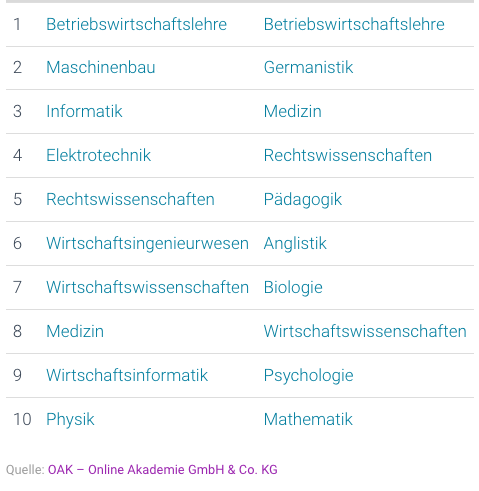Einheit 2.4 (online)
 |
 |
Schule und Studium in Deutschland
The school system and the university system in Germany are very different from what you might be familiar with. All children in Germany attend elementary school for 4 years, and then they go to different types of secondary school (completing 9 or 10 grades and then apprentice for a job, or completing 12 or 13 grades to be able to study at the university).
Watch the following video for more info about the German School System.
German also distinguishes between different words used at the school or the university level. Students in school are called Schüler and Schülerinnen, whereas students at the university are referred to as Studenten and Studentinnen. Instructors are also described with different terms: a Lehrer or Lehrerin teaches at a school, whereas a Professor or Professorin teaches at the university. Some subjects of study also have different names, depending on whether you take them in school or at the university. For example, the subject Deutsch in school is called Germanistik at the university, and the subject Englisch in school would be called Anglistik, Amerikanistik, or Kanadistik (depending on the focus of your studies). The English verb to study might also mean different things in German: when someone studies for a test or exam, they would use lernen. When someone talks about the subject that they are studying (for a degree), they would use the verb studieren. For example: Ich lerne für meinen Mathetest. Ich studiere Mathematik.
Watch the following video about the German Higher Education System.
![]() Die 10 beliebtesten Studiengänge in …
Die 10 beliebtesten Studiengänge in …
| Deutschland | Kanada |
| Männer Frauen | |
 |
Source: University Magazine |
![]() Studienfächer
Studienfächer
“Wissenschaft”
You may be asking yourself, why do so many subjects have the word Wissenschaft in it? For example, you have seen Politikwissenschaft, Medienwissenschaft, and Naturwissenschaft. In German, Wissenschaft refers to the systematic study of a subject matter. In English, it could be translated as science (as in political science) or studies (as in media studies). Many other subjects that can be studied at the university also have the suffix -wissenschaft (en), for example Theaterwissenschaft, Sprachwissenschaft, Kommunikationswissenschaft, Wirtschaftswissenschaften, or Literaturwissenschaft.
In English, we often tend to think of subjects such as biology, chemistry, or physics when we talk about science. In German, these subjects would be described as natural sciences or Naturwissenschaften.
Lerntipps!
- Read first, then listen or watch! Always read over the questions associated with a listening activity or video.
- You always want to know what you are listening for.
- Always read the title, instructions and look at any pictures provided. They often provide clues and maybe even answer a question for you!
![]() Studierende in den USA
Studierende in den USA
Watch a video from Easy German until 1:23 and then complete Übung 1. If you want to learn more about the difference between studying in Germany and the USA watch the entire video.
![]() Übung 1: Nach dem Sehen: Was haben Sie verstanden?
Übung 1: Nach dem Sehen: Was haben Sie verstanden?
![]() Was studieren Sie? Please answer the following questions in full sentences and bring your answers with you to your next class. You can use dict.cc if we haven’t learned it yet. Look for acad. or educ. in the online dictionary to know that it is a subject of study. If you cannot find a translation for what you study, please pick a subject of study that is close to what you are studying.
Was studieren Sie? Please answer the following questions in full sentences and bring your answers with you to your next class. You can use dict.cc if we haven’t learned it yet. Look for acad. or educ. in the online dictionary to know that it is a subject of study. If you cannot find a translation for what you study, please pick a subject of study that is close to what you are studying.
1. Was ist Ihr Hauptfach / Ihr Nebenfach? Mein Hauptfach ist … / Mein Nebenfach ist …
2. Welche Kurse haben Sie dieses Semester? Dieses Semester habe ich …
![]() Grammatik
Grammatik
The Nominative Case & Word Order in Statements
Please work through the following presentation to learn about the nominative case and word order in statements.
![]() Übung 2
Übung 2
![]() Grammatik
Grammatik
Possessive Determiners
Since the beginning of this book you have seen examples of possessive determiners.
Mein Name ist …
Das ist meine beste Freundin und ihr Hauptfach ist Chemie.
Ist deine Lieblingsfarbe Blau?
Was ist Ihr Nebenfach?
These little words indicate possession or relationship and precede a noun (e.g., my name, her major, your minor, etc). In the nominative case, masculine and neuter do not have an ending, whereas feminine and plural add an -e. The ending is determined by the gender of the noun that it precedes.
mein/meine – my
dein/deine – your (informal, singular)
sein/seine – his
ihr/ihre – her
Ihr/Ihre – your (formal, singular or plural)
We will learn all of the possessive determiners in Einheit 3.4.
![]() Übung 3
Übung 3
![]() Wortschatz in Quizlet:
Wortschatz in Quizlet:
![]() Was wissen Sie jetzt? Klicken Sie hier für “Online Practice” 2.4.
Was wissen Sie jetzt? Klicken Sie hier für “Online Practice” 2.4.
Extra Practice (optional):
![]() 5 Minute German Grammar
5 Minute German Grammar
If you want extra practice on the grammar concepts learned today, click the topic below:
Nominative case
Introduction to German syntax
![]() Meet the Germans
Meet the Germans
If you want more information on studying in Germany in general, watch this video.
![]() Germany in a Nutshell
Germany in a Nutshell
If you want more information about studying in Germany as an international student, watch this video.
Media Attributions
- Johannes Gutenberg Universität Mainz is licensed under a CC BY-NC-SA (Attribution NonCommercial ShareAlike) license
- Universität-Frankfurt-Bei-Tag © ThereWasNoHope is licensed under a CC BY-SA (Attribution ShareAlike) license
- presentation icon © quinntheislander adapted by Solomon Hajramezan is licensed under a Public Domain license
- Top 10 Studiengänge in Deutschland
- play © IO-Images is licensed under a Public Domain license
- star © IO-Images is licensed under a Public Domain license
- pen © IO-Images is licensed under a Public Domain license
- light-bulb © IO-Images is licensed under a Public Domain license
- link © IO-Images is licensed under a Public Domain license
- check mark © janjf93 adapted by Solomon Hajramezan is licensed under a Public Domain license

